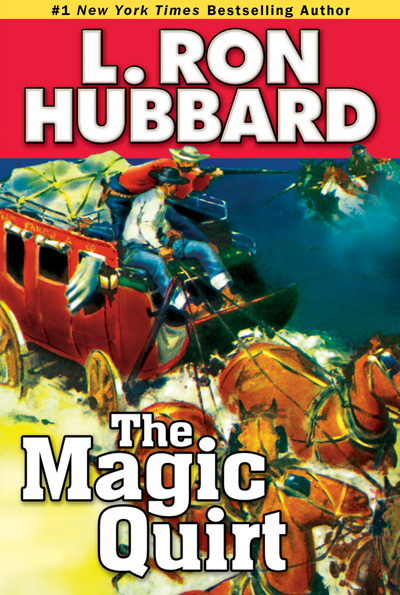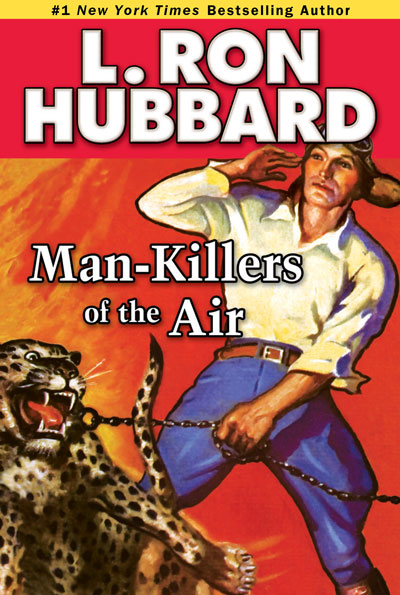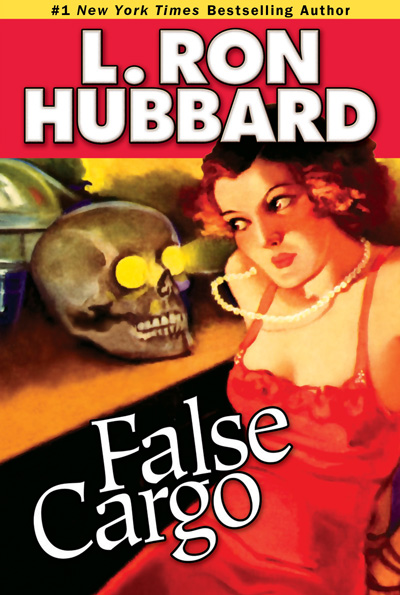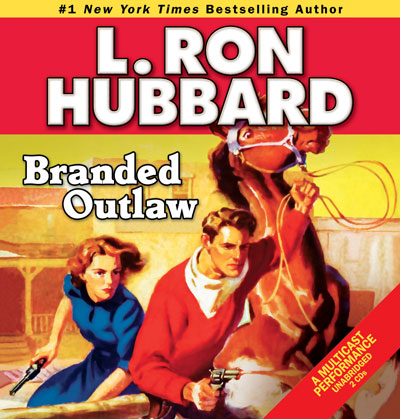Take the law into your own hands, and you risk losing your grip on everything else—including your life. Lee Weston is as good-looking as he is quick-tempered, and he’s got a lot to be angry about.
His father murdered, his family ranch torched, he goes gunning for Harvey Dodge—the man who he’s convinced is the killer—and it’s Lee who ends up on the wrong side of the law. Shot in a gunfight, on the run, and running out of time, he holes up in a mountain hideout and waits for death to come find him.
But he wakes up in the arms of a beautiful woman who has beat death to his door and nursed him back to life. She’s the first and only woman he has ever fallen for, and her name is Ellen Dodge—Harvey’s daughter. Can a great loss lead to a great love? Can the search for revenge lead to redemption? The answers lie in the wild heart of the Wild West—in Branded Outlaw.
“Packs a ton of action and some priceless shootout scenes.” —EZReader.com
SAMPLE
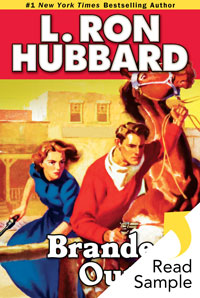
ABOUT THE AUTHOR
L. Ron Hubbard was so prolific, and his stories so much in demand, he occasionally had to publish under a pseudonym to ensure that his name wouldn’t appear twice in a single issue of a magazine. Thus did Branded Outlaw originally appear as being written by a writer named Barry Randolph. But as is clear from the action and authenticity of the story, it was L. Ron Hubbard behind the curtain pulling the levers. This is one of sixteen westerns he wrote in 1938—all influenced by a foray into New Mexico to round out his research. His unsurpassed knowledge of the West originated in his years growing up—and riding on—the range.
Branded Outlaw Glossary
Stories from the Golden Age reflect the words and expressions used in the 1930s and 1940s, adding unique flavor and authenticity to the tales. While a character’s speech may often reflect regional origins, it also can convey attitudes common in the day. So that readers can better grasp such cultural and historical terms, uncommon words or expressions of the era, the following glossary has been provided.
batwings: long chaps (leather leggings the cowboy wears to protect his legs) with big flaps of leather. They usually fasten with rings and snaps.
beat, see the: to hear of or to see someone or something better than or surpassing (someone or something else).
caballero: (Spanish) gentleman.
Castilian: a native or inhabitant of Castile, a former kingdom comprising most of Spain.
Chisholm Trail: a cattle trail leading north from San Antonio, Texas, to Abilene, Kansas; used in the late 1800s for about twenty years after the Civil War to drive cattle northward to the railhead of the Kansas Pacific Railway, where they were shipped eastward.
Colt: the cowboy’s favorite gun, also known as the Peacemaker. It was the earliest type of revolver, invented and manufactured by Samuel Colt (1814–1862), who revolutionized the firearms industry.
combines: combinations of persons or groups for the furtherance of political, commercial or other interests.
court to, paid: tried to win somebody’s love.
cow town: a town at the end of the trail from which cattle were shipped; later applied to towns in the cattle country that depended upon the cowman and his trade for their existence.
coyote: a contemptible person, especially a greedy or dishonest one.
Custer’s Last Stand: also known as the Battle of the Little Bighorn, a battle between US Cavalry troops and Native Americans in 1876 near the Little Bighorn River in what is now Montana. The battle was the most famous incident in the Indian Wars, in which a US Cavalry detachment commanded by Lieutenant Colonel George Armstrong Custer was annihilated.
Derringer: a pocket-sized, short-barreled, large-caliber pistol. Named for the US gunsmith Henry Deringer (1786–1868), who designed it.
diggings: living quarters; lodgings.
’dobe: short for adobe; a building constructed with sun-dried bricks made from clay.
don: (Spanish) Mr.; a title of respect before a man’s first name.
dragnet: to systematically search for a wanted person.
fastnesses: remote and secluded places; secure places, well protected by natural features.
forty-one or .41: Derringer .41-caliber short pistol. Named for the US gunsmith Henry Deringer (1786–1868), who designed it.
G-men: government men; agents of the Federal Bureau of Investigation.
gumbo: soil that turns very sticky and muddy when it becomes wet; found throughout the central US.
hell on skates: also “hell on wheels”; very impressive.
Hickok: James Butler Hickok or better known as Wild Bill Hickok (1837–1876), a legendary figure in the American Old West. After fighting in the Union army during the Civil War, he became a famous army scout and, later, lawman and gunfighter.
hole card: (poker) a playing card dealt face down and not revealed until the showdown.
Holliday: John Henry “Doc” Holliday (1851–1887), an American dentist, gambler and gunfighter of the Old West frontier. He is usually remembered for his association with the famous marshal of the Arizona Territory, Wyatt Earp, whom he joined in the gunfight at the OK Corral against members of the Clanton gang of suspected cattle rustlers.
hoss: horse.
in arms: up in arms; ready to take action; outraged.
iron: a handgun, especially a revolver.
jasper: a fellow; a guy.
jerk: to preserve (meat, especially beef) by cutting in strips and curing by drying in the sun.
Judge Colt: a Colt designed by Samuel Colt. This was a handgun with a revolving cylinder of chambers allowing six shots to be fired without reloading. Over the years the revolver was given nicknames including “Judge Colt and his jury of six” or “Judge Colt.”
KC: Kansas City.
la hacienda de Obañon: (Spanish) the ranch of Obañon.
leg-of-mutton silk sleeve: a silk sleeve that is extremely wide over the upper arm and narrow from the elbow to the wrist.
livery stable: a stable that accommodates and looks after horses for their owners.
lynch mob: a group of people who capture and hang someone without legal arrest and trial, because they think the person has committed a crime.
Madre de Dios: (Spanish) Mother of God.
major-domo: a man in charge of a great household, as that of a sovereign; a chief steward.
Masterson: William Barclay “Bat” Masterson (1853–1921), a legendary figure of the American West. He lived an adventurous life, which included stints as a buffalo hunter, US Army scout, gambler, frontier lawman, US marshal and, finally, sports editor and columnist for a New York newspaper.
mean: unimposing or shabby.
mesquite: any of several small spiny trees or shrubs native to the southwestern US and Mexico, and important as plants for bees and forage for cattle.
mow: haymow; the upper floor of a barn or stable used for storing hay.
muy hidalgo: (Spanish) very noble.
neck-reined: guided a horse by pressure of the reins against its neck.
Overland: Sanderson’s Overland Stage Company; a well-known firm that ran a mountain stage line that serviced a large portion of southern Colorado and northern New Mexico during the late 1800s.
owl-hoot: outlaw.
Piedmont: a type of horse bred in the Piedmont region, an area of land lying between the Appalachian Mountains and the Atlantic coast.
pitching hole: refers to a hole that provides access to the haymow (the upper floor of a barn or stable used for storing hay). It is used to pitch hay down to the animals.
puncher: a hired hand who tends cattle and performs other duties on horseback.
pushing up prickly pear: variation of “pushing up daisies”; to be dead. A prickly pear is a cactus with flattened, jointed, spiny stems and pear-shaped fruits that are edible in some species.
quirt: 1. a riding whip with a short handle and a braided leather lash. 2. to use a quirt.
ranny: ranahan; a cowboy or top ranch hand.
remuda: a group of saddle horses from which ranch hands pick mounts for the day.
riata: a long noosed rope used to catch animals.
royal flush: in poker, the highest “flush” or sequence of five consecutive cards of the same suit, including an ace, king, queen, jack and ten.
saddle boot: a close-fitting covering or case for a gun or other weapon that straps to a saddle.
Saint Ignacio: Saint Ignatius of Loyola, a Catholic saint. Used as an exclamation.
sand: courage and determination.
Scheherazade: the female narrator of The Arabian Nights, who during one thousand and one adventurous nights saved her life by entertaining her husband, the king, with stories.
serape: a long, brightly colored woolen blanket worn as a cloak by some men from Mexico, Central America and South America.
seven-day wonder: someone or something that causes interest or excitement for a short period but is then quickly forgotten.
sombrero: a Mexican style of hat that was common in the Southwest. It had a high-curved wide brim, a long, loose chin strap and the crown was dented at the top. Like cowboy hats generally, it kept off the sun and rain, fended off the branches and served as a handy bucket or cup.
stock: 1. a collar or a neckcloth fitting like a band around the neck. 2. livestock.
Teutonic: of, pertaining to, or characteristic of the Teutons or Germans; German. (A Teuton is a member of a Germanic people or tribe first mentioned in the fourth century BC.)
tinhorn: a gambler of a cheap, flashy, pretentious kind.
Walker pistol: a Colt Walker pistol, originally manufactured in 1847, named after Captain Samuel Hamilton Walker, a renowned national hero who had fought in the Texas-Mexico wars.
willow grate: an open lattice frame for cooking over a fire, made from the tough, pliable branches of a willow tree.
Winchester: an early family of repeating rifles; a single-barreled rifle containing multiple rounds of ammunition. Manufactured by the Winchester Repeating Arms Company, it was widely used in the US during the latter half of the nineteenth century. The 1873 model is often called “the gun that won the West” for its immense popularity at that time, as well as its use in fictional Westerns.







